CLICK ON IMAGES YOU WISH TO ENLARGE. REPEAT IF NECESSARY. DISAPPOINTINGLY THIS DOESN’T WORK FOR THE COLOUR PLATES WHICH BECOME TOO PIXELLATED.
I failed an intelligence test this morning.
Well, in fairness no-one told me that the weedkiller sachets contained further such items. You see, it was my task to zap the weeds in the cracks between the concrete sections of the front drive, and its accompanying gravel path.
So. I merrily tore of the top of the outer covering and tipped the contents into 5 litres of water. I would have immediately added four more inner sachets. But I noticed a transparent packet bearing floating minuscule sections of what looked like vermicelli, and strove to extract this. Ah. It was soluble. So I got the poison all over my fingers and had to wash it off. Of course, the mini-pasta also dissolved, as it was meant to do.
Well, now I know.
Our first iris foetidissima bloomed today. Its days are numbered because The Head Gardener is less partial to them than I am. It must be something in the name.
This afternoon I finished reading:
This volume has adorned my bookshelves for 34 years, but, although I have often perused the pictures, I only began to read it a few days ago.
The Encyclopaedia Britannica has this to say about the author:
‘Friedrich Heinrich Karl de la Motte, Baron Fouqué, (born February 12, 1777, Brandenburg—died January 23, 1843, Berlin) German novelist and playwright remembered chiefly as the author of the popular fairy tale Undine (1811).
Fouqué was a descendant of French aristocrats, an eager reader of English and Scandinavian literature and Greek and Norse myths, and a military officer. He became a serious writer after he met scholar and critic August Wilhelm Schlegel. In his writings Fouqué expressed heroic ideals of chivalry designed to arouse a sense of German tradition and national character in his contemporaries during the Napoleonic era.
A prolific writer, Fouqué gathered much of his material from Scandinavian sagas and myths. His dramatic trilogy, Der Held des Nordens (1808–10; “Hero of the North”), is the first modern dramatic treatment of the Nibelung story and a precedent for the later dramas of Friedrich Hebbel and the operas of Richard Wagner.’
It is a measure of the prowess of the artist, the foremost English book illustrator of the early twentieth century, Arthur Rackham,
that it is his name that appears on the front cover,
although the writer features on the spine.
One reason I never pursued book illustration as a career was that I knew I had no hope of ever matching this master.
There are 15 colour plates in my Heinemann edition. I forced myself to make a limited selection, and chose these two examples of the many moods Rackham is capable of evoking. He is noted for his trees.
Each chapter is topped and tailed by an exquisite little vignette, pertinent to the story.
Let us not forget the translator, W. L. Courtney, who has produced a beautifully poetic rendering of the original romantic fable of 1811. I do not know how far from the original he has strayed, but suitably quaint archaic language speaks of the bygone days of knights, honour, chivalry, water sprites, and magic. The poetic prose is especially descriptive. It was fun to read, even without Mr. Rackham’s input.
This evening we dined on chicken marinaded overnight in lemon and piri-piri sauce, carrots, runner beans, ratatouille, and mashed potato and swede, followed by lemon tart and cream. The Cook drank Hoegaarden and I drank la Croix des Celestins Fleurie 2014.


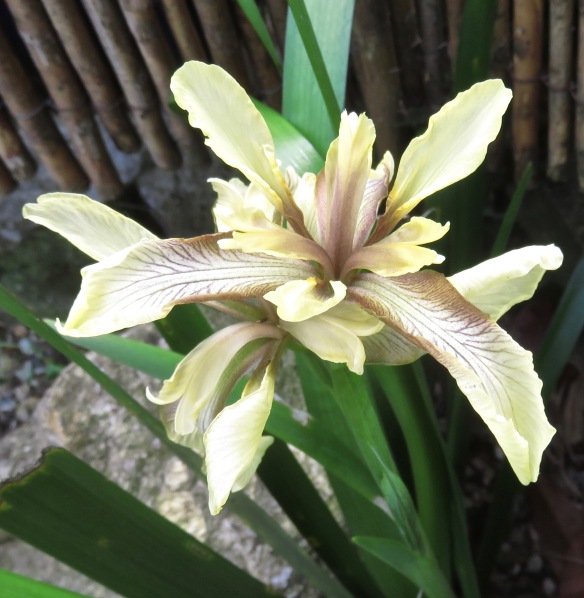
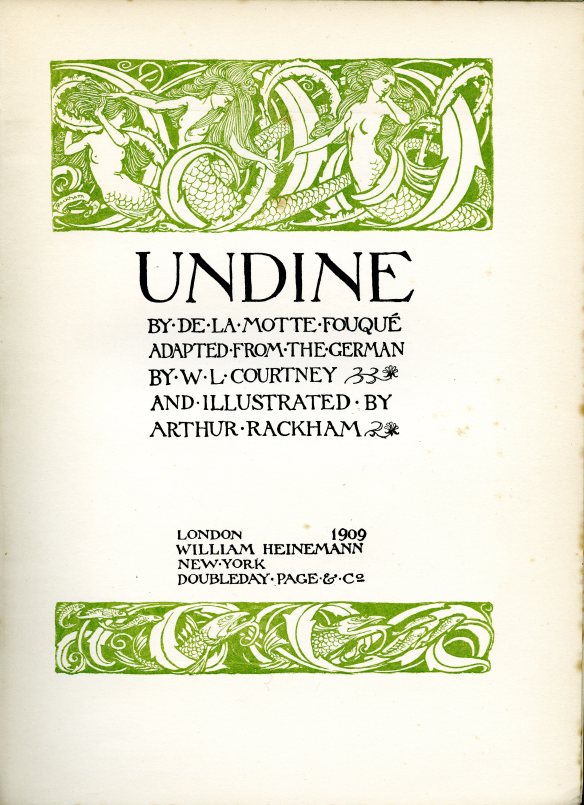
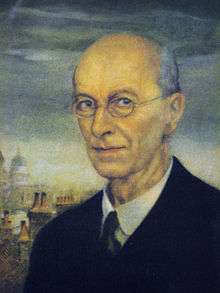
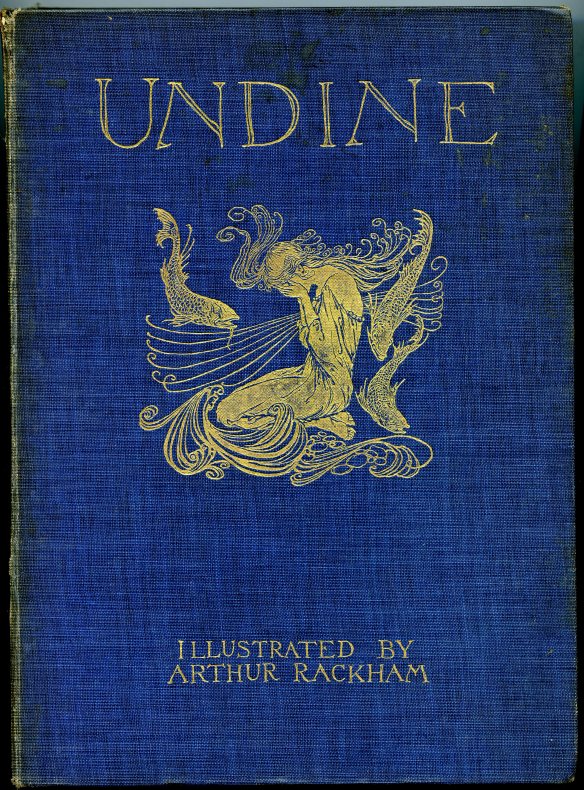


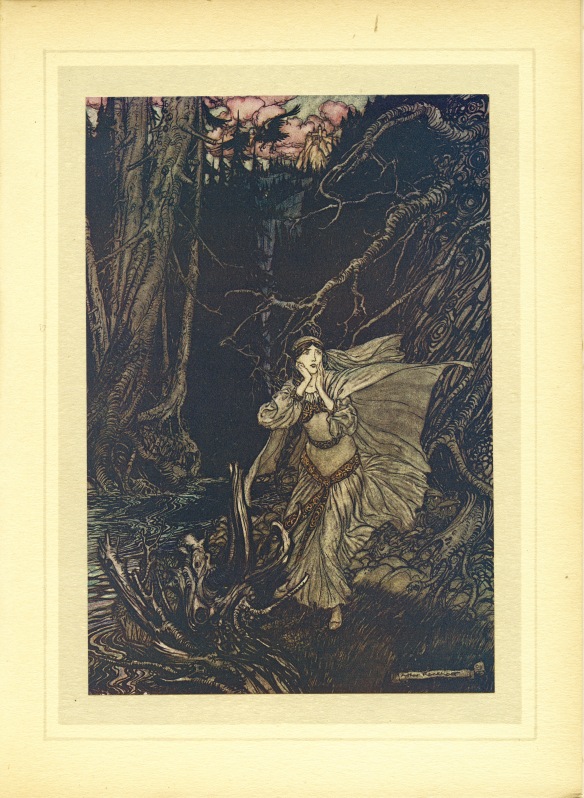
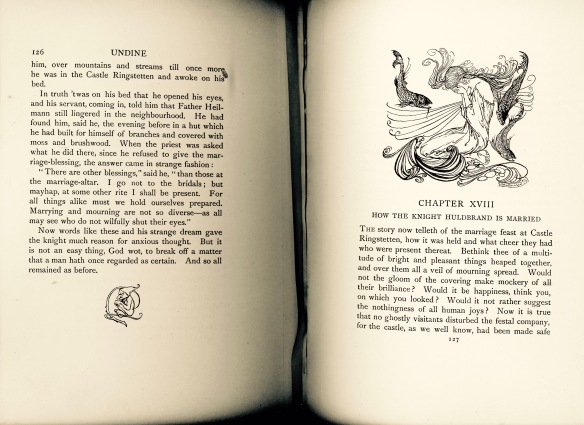
I agree with you. The iris is beautiful. As for the book, I read another version of the fable but this seems delightful also because of the beautiful vignettes
Thank you, Geetha
Welcome. There is always something new and beautiful to discover with your posts 🙂
Jackie may not like the name of the iris, but it is a, outstanding flower!!
Thanks, GP 🙂
I take it it’s more the translation of the name? “Most fetid” would seem to be crying out for a marketing person… Does it actually stink?
I don’t think so
Careful with the weed killer, Derrick. Always read the instructions. In fact, read them before you buy, as they can be so alarming that you may decide you don’t need the stuff. Rackham’s illustrations are a delight. I love the one with the wind blowing on the hillside…
Many thanks, Lisa. I did use some last year, but I forgot 🙂
Ah, so a memory test, not an intelligence test 🙂
🙂
Yumm a wonderful meal and nice post!
Thanks, Lynn
your food always sounds so delightful Derrick!
Of course you are a lover of books, as well as all of the other things you do. That makes total sense. I know just what you mean by “not pursuing a career” because his beautiful work made you feel unworthy . . . I wrote a novel, but every time I read Nabokov’s beginning to “Lolita”, I am so impressed I know I can’t measure up.
Thanks, Jodie. But something a little less than the very best is actually good enough 🙂
True, true . . . 🙂
The illustrations are beautiful.
I’m glad there were no serious problems from the weed killer incident!
Thanks, Merril.
j-j-j-u-u-u-s-s-s-t-t-t w-w-w-a-a-a-i-i-i-t-t-t t-t-t-i-i-i-l-l-l-l-l-l t-t-t-o-o-o-m-m-m-o-o-o-r-r-r-r-r-r-o-o-o-w-w-w…
Now you know! Be careful with that poison, Derrick.
Thanks, Jill
Gorgeous book!
Thanks, Leslie. It is
I love bearded iris, dutch iris and siberian iris, but when it comes to stinking iris, I think I would side with Jackie! 🙂
Thanks, Cynthia 🙂
I actually like this particular plant as it flowers nicely, but, in general, it is a bit of a weed and spreads everywhere very quickly, the flowers, tho’ lovely are very short lived, so I do tend to pull it up when I have something that will make better use of a space in the garden. I don’t hate it though.
I wanted to tell you that I have one Arthur Rackham illustrated book, Derrick!! It is, “The Night Before Christmas.” I like the tiny elf which is necessary to transport up and down the chimney, instead of our Jolly Fat Santa Claus! I will have to check but in a basket of Christmas books, one year when I posted alll the titles, I think I also mentioned his name. Alas, it is not on my list of names along my subject tags, though. I love the way the details are so “scrolly” and very elaborate, he was a wonderful artist. I also think he illustrated “Fancy’s Hour,” but I am not at home, just at the library. The illustrations for such books are indeed daunting and I would never attempt such beautiful detailed artwork because it would “pale” in comparison. 🙂
Thanks for sharing “Undine” and also, the beautiful fancy Iris.
Many thanks, Robin. I did have a go in my teens. He was my model. I wouldn’t have produced anything like him
I’m not a fan of weed killer, but Arthur Rackham, oh my.
Thanks, Brenda
I am not a fan of weed killer or foetid irises, but I am with you on Arthur Rackham. He adorned many a book in my childhood book collection and then, years later, in my children’s vast library a book could often be found simply because his illustrations were included. He was indeed a peerless master!
Thanks, Pauline. He was. A Londoner, born in Lewisham
I love bookbinding, and Arthur Rackham. That is a precious book you have there. It has been a difficult time letting go of my books.
Thank you very much, Sol. I feel for you over the books
The iris is indeed easy on the iris. It’s also known as the Gladwin Iris – so perhaps the flower is more acceptable with that name? (Gladwin being the maiden name of my maternal great-grandmother – a laundry maid – who married way above her station).
Thanks, Bruce. I know they hold weddings in wineries in Oz, but above a station is a new one on me
Surely to goodness not!!! The laundry maid married a Lightoller – a Chorley cotton mill owner – you clearly need to be trained as to the meaning of station! 😀
Obviously I was on the wrong track
I’m chuffed at your humility.
I now gracefully admit defeat
Now, Derrick you it may be that you “dined in chicken” and it would be a wonder; I would want to know all about it. But likely you dined at table in the dining room or out of doors in the sweet spring light….What say you? 🙂 And I covert your volume; illustrations and story could not likely be more romantic! Lovely post.
Thanks, Cynthia, especially for returning the poof redding favour. Actually it had turned chilly so we dined indoors.
You may notice the “covert”. Perhaps I thought it a spy novel, as well…oops.
Beautiful book! If yours is a First Edition, they sell for over $200 online. What a lovely family heirloom that would be and considering you’ve kept it for 34 years. You spoke of not being able to match the talents of the book’s illustrator. Do you draw, Derrick?
Thanks, Rose. The book is a first edition I paid £85 for it in 1982. I have occasionally featured a drawing in a post. You might like this one: https://derrickjknight.com/2012/07/15/portrait-of-a-lady/
Beautiful drawing Derrick! I hope you’ll post more of your drawings in the future. Thank you!
Your book has more than doubled what you’d paid for it originally. Great investment. 😊
Thank you Rose: https://derrickjknight.com/2013/12/29/toytown/ that one’s for fun
Don’t worry about the poison, Derrick. When glyphosate was first marketed here the salesmen used to drink it to prove that it’s harmless. Funny; never heard from them again…
Much as I dislike books with illustrations as they destroy the images in my head, I must admit to admiring those pink clouds.
I hope you find a good home for the Iris. It somehow reminds me of the illustrations in your book, only lovelier. 🙂
Thank you very much, Mary. Your third sentence could have been written by Bruce Almighty 🙂 I like to see how the artist interprets the tale. I’m glad you like the iris
I don’t mind the art, just the intrusion on my reading 🙂
If illustrations interrupt a passage at the bottom of a page, I skip the pic until there is a natural break, then go back to it.
I seldom notice them now so in fact they don’t bother me any more 🙂
A beautiful flower and a beautiful book.
Thank you, John
When I first read the title “Undine” I thought you were going to tell a tale of interrupted digestion. Fortunately it turned out to be a groundless fear. 😉
As for the weed killer, watch out you don’t get nominated for a Darwin Award!
http://www.telegraph.co.uk/news/newstopics/howaboutthat/11288563/The-Darwin-Awards-20-years-of-lethal-stupidity.html
Nice one, Quercus. Thanks
I love old books, I have one that’s almost a hundred years old…tattered but I keep,it in a ziplock bag so it doesn’t get further damaged…not many pics in it, dinner sounded yummy and your flower is pretty😊
The iris is beautiful! And Derrick, I guess we are always learning something new everyday – be careful with the poison! Happy day my friend! 🙂
Thanks, Terry
Derrick – what a treat! I have long loved Arthur Rackham. My grandfather was of his ilk and before he killed himself was a very talented artist, though I must say of all those who followed, Rackham really stood alone, in his exquisite ability to render fantasy and myth. I have a few of his works framed (prints obviously or I should be a rich lady indeed) so this brought a big smile to my face. The second smile of the day came in the first paragraph – I failed an intelligence test – to which I laugh haughtily and say, if you fail then we all fail! For you my friend, are everything intelligent. Great post, really enjoyed this!
Very many thanks, Candice
There’s a piece called the “Undine” Flute Sonata by Carl Reinecke. It is based on the book and is one of the most popular flute pieces ever. Do you know it?
I didn’t know that, Weekly. Thanks
I thought Debussy or Ravel included piece called Undine / Water Nymph in a piano suite.
Thanks for sparing us any more of Bruce’s train puns.
Thanks, Paul. You always have to concede with the Almighty
A treasure of a book, Derrick! Goes with the Iris! So glad you didn’t lick your fingers earlier! 🙂
Wonderful Post. Can not go wrong with a post about classic fantasy literature and Arthur Rackham as far as I’m concerned. 🙂
There are some versions of Undine on Project Gutenberg and LibriVOX.
Thanks very much, Joseph
Beautifully flowing illustrations expressing the whimsical character of the water nymph. I remember playing Debussy’s Ondine in college and having the same feeling.
Thank you very much, Dolly – especially for following the link
The pleasure is mine, Derrick.
Eek on the poison…Well, we live and learn. 🙂
The illustrations in that book are stunningly beautiful…they just capture me into the scene! 🙂
I love irises! They were one of my dad’s fav flower so they’ve always meant a lot to me and especially more so since he passed away.
(((HUGS)))
Thank you so much, Carolyn X
Ack my comments ended up on the wrong post!
🙂
Such images have long delighted me.